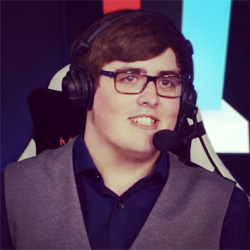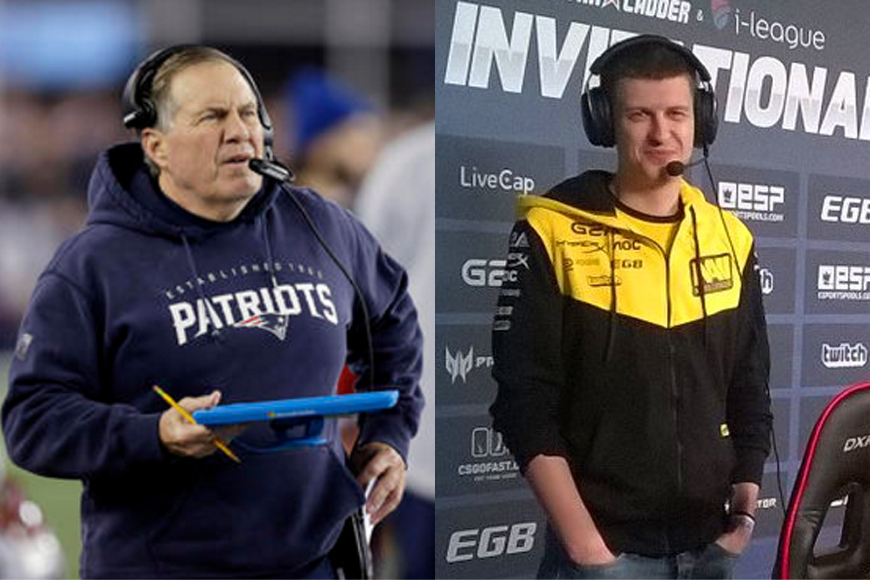Bill Belichick, coach for the Patriots’ NFL football team (left) and Sergey “starix” Ischuk, coach for Natus Vincere’s CSGO side (right)
CSGO developer Valve has introduced a rule which means coaches are now limited to communicating with players during warm-up, half-time and one of four new 30-second timeouts that the coach or player can call.
In this guest opinion piece, UK eSports caster Joshua “Dowsey” Dowse says Valve’s new coach communication restriction is a step back for competitive CSGO.
As a kid growing up down under, my childhood was shaped by the great outdoors and sports. I played soccer (ok ok, football) when I was young, swam squad as a teen and played rugby union as a student.
I’ve been an avid Rugby League fan my whole life (Go Parramatta Eels!) and like most Australians, I got interested in American Football when rugby superstar Jarryd Hayne decided to have a go.
My love for eSports developed during League of Legends’ Season 3, and from there I’ve found myself commentating the game, as well as Counter-Strike: Global Offensive and Overwatch.
One of the things I love about CSGO is the number of similarities it has with a traditional sport. Set plays, a point based scoring system, halftime and a switch of sides, a (semi) reset of play when a point is scored etc.
Whenever I introduce anyone to an eSports title, I always choose CSGO as the correlations make it easy for someone to pick up.
When coaches were brought into eSports, I got really excited. This meant that organisations were taking the game, as well as their players, seriously enough to invest in experts in an attempt to raise the level of play.
A problem arose when coaches in CSGO had their responsibilities shifted from preparation, strategy and training, to becoming in-game leaders (IGL). Fnatic, NiP and Team Liquid have all found success running IGL coaches, and coaches have started requesting more in-game access to make this new responsibility easier.
There is something very wrong with a sixth person playing the game through five players, so I can understand why Valve wants to set a precedent and shut it down early. In an announcement last week, Valve stated that it would be changing its rule-set in relation to coaches.
“With unrestricted communication with their players, coaches can currently function as a sixth player, and not solely as a source of guidance or training. Activities such as keeping track of the economy, calling plays and general situational awareness are important components of CS gameplay. If a person is performing these actions, we consider them a player.
“During a match, the coach may only communicate with the players during warmup, half-time, or during one of four 30-second timeouts that the coach or player can call.”
CSGO dev team, Valve
Whilst this decision has come from the right place, Valve has taken one step too far with this rule change. To explore this, we’ll need to take a detour into the world of traditional sports, where the coaches not only train, teach and develop strategies with their players, but also implement them from the sideline as well.
Traditional sports such as American Football have a surprising amount of correlations with CSGO. Both games are non-continuous, both games heavily rely on positioning across the field of play and both games are made up for set-plays to gain advantages over the opponents.
In American Football, the quarterback, linebacker or safety will have contact with the coaches through hand signals and radio contact before the start of play. This allows a coach to call what play the team should be looking to play.
Of course, when the field of play becomes active, the quarterback/linebacker/safety will often have to use critical thinking to run through a list of possibilities.
“Can I make play number one? No. Play number two? No. Play number three? Yes.”
There are also times when the players will decide to make a completely different decision based on their read of the field before the ball is in play. Variables will change last second and the best course of action along with it. These decisions can be made in a split second, and showcase the abilities of the coaching staff – as well as the on-field leader – to make the right call in the heat of the moment.
“Four-Niner-Tango-Husky. Hut, Hut, Hike!”
CSGO hasn’t quite evolved into such computer-script-like decision making, but it eventually will as the game evolves. Teams have already developed and use set-plays such as a series of smoke grenades, molotovs and flashes to take or retake a site.
With this new rule change, Valve has correctly identified that there should be a definite distinction between coach and player, but it’s currently saying that coaches shall no longer have a part to play in deciding how a team approaches a round. This is a serious step back for strategy, and risks throwing the strategic element of CSGO back into the dark ages.
“This is a serious step back for strategy, and risks throwing the strategic element of CSGO back into the dark ages.”
Valve states that if someone is “keeping track of the economy” or “calling plays” that they’re just another player, and if that person was doing so in the moment of the game I’d tend to agree. However, a quick look at traditional sports will show that a team will have someone hired to do just that, take notes on statistics for a coach to then use where they see fit.
What needs to change is where Valve places that divider between coach and player, as currently it’s too far from the centre.
In CSGO, there is a 20-second window between rounds where a team must decide how it’s going to approach its next play. This is where, traditionally, a coach has been most valuable to any sports team. The coach isn’t feeling the same mental or emotional strain a player feels, and is able to be a voice of clarity.
A good coach is able to recommend a new direction, or reinforce an old one when players start getting inside their own heads. American football coaches use a specialised language and code to be able to communication a lot of instructions in a short period of time. Only one player on the field is permitted to have a radio helmet, and radio contact cuts off with 15 seconds till the ball is in play. This then allows time for the team to use critical thinking to decide on the best course of action.
In a perfect world, the decision the coach makes will be right, but there are too many variables in CSGO for the coach to be right every time, and this is where team needs a solid IGL to be able to change the course of action in real-time. SelflessGG’s owner Steve “Ryu” Rattacasa sums it up best in his tweet:
Imagine the NFL being like “Coaches, you can talk during warm up and half time. That’s it.”
— Ryu (@SelflessRyu) 17 August 2016
The fact Valve has only allowed the coach to talk to the players during one of four possible timeouts a team can call is ridiculous – and should be reconsidered immediately. It’s wrong and arrogant to not look at traditional sports and learn from its successes, and sometimes this is the narrative of eSports as we try and create something new which we can call ours.
It’s of course important to remember that eSports is and will always be played on a much smaller scale to a traditional sport like American football. Instead of 45 players, a CSGO team will have five, possibly six in the case of a substitute.
Instead of the 16 coaches in an American football team, CSGO will likely only have one coach with a few analysts. But this shouldn’t change the approach to the game. If Valve decides to keep the coach rule change as is, and continue to stop coaches from communicating with their players during CSGO’s out of play moments, CSGO will never be allowed to realise its full potential as a game of tactical complexity and player talent equal to traditional sports.
CSGO currently occupies a status as the most similar eSport to any traditional sport with a large mainstream following, and at a time that could be crucial to its further success, Valve’s statement on what a coach’s responsibilities should be will only do more harm than good.
If you’re looking to learn more about coaching, especially in traditional sports, then Joshua recommends this 40-minute documentary on the success of head coach Bill Belichick and the 2014 New England Patriots.

Joshua “Dowsey” Dowse is an Australian-English shoutcaster who has cast various UK eSports tournaments and matches, including the ESL UK Premiership, Multiplay Insomnia and the National University Esports League (NUEL).
He’s predominantly a play-by-play caster but can also work as a colour caster. Dowsey started a YouTube channel in 2010, which he grew to 60,000 subscribers, before graduating with a First Class BSc (Hons) in Film Production Technology and moving into eSports.
Web: xdowsey.com
Twitter: xDowsey
YouTube: xDowsey


